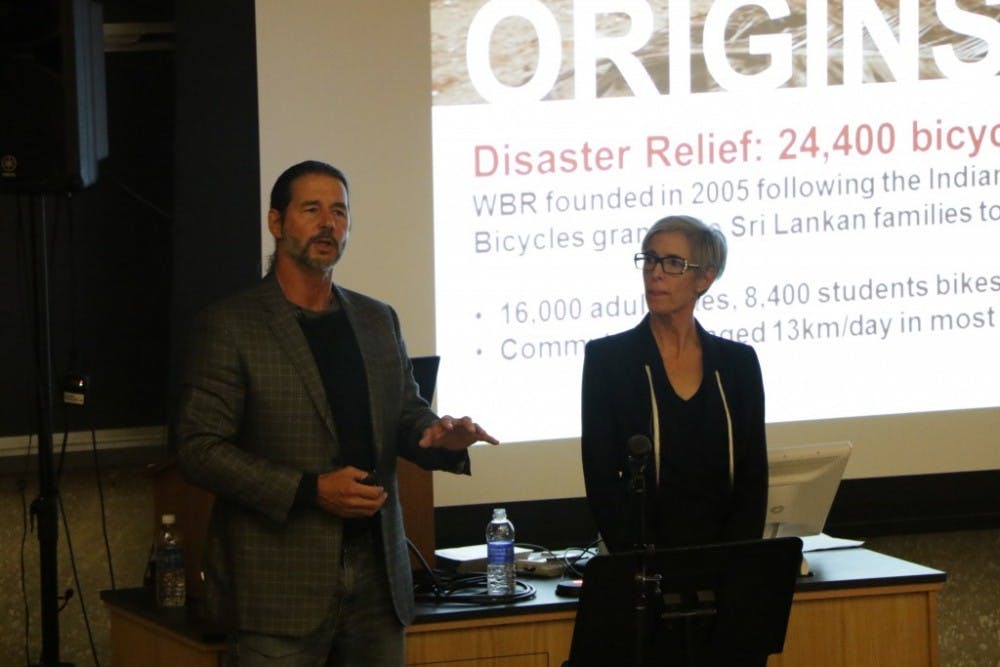This year’s Foreign Affairs Symposium (FAS) concluded with a talk hosted by the founders of World Bicycle Relief (WBR), an international non-profit that provides bicycles to citizens in rural areas of developing countries.
Leah and Frederick “F.K.” Day were honored with the Anne Smedinghoff Award, which commemorates Smedinghoff, Class of 2009, a former FAS Executive Director, who was killed by a suicide bombing in Afghanistan in 2013. The event was held in Mudd Hall on April 7.
The Smedinghoff Award honors an individual’s commitment to the Hopkins alumna’s values of education, development and global harmony. Smedinghoff was killed while delivering books to underprivileged children. Junior Jack Laylin, Executive Director of FAS, spoke about Smedinghoff’s legacy to the symposium before presenting the award to its recipients.
“Anne embodies everything FAS stands for and her presence will never be forgotten by our staff,” he said. “Without Anne, FAS would not have discovered the incredible work of World Bicycle Relief.”
WBR strives to improve access to education, healthcare and economic opportunities in rural areas, particularly in Africa, by increasing the availability of transportation.
According to Leah Day, access to bicycles will provide people with more opportunities for work and travel.
“We’re in this to mobilize people through the power of bicycles,” she said. “We envision a world where barriers are no longer in between your freedom and your mobility and access to your livelihood.”
WBR was founded following the 2004 Indian Ocean tsunami. Working for SRAM Corporation, a high-end bike components company, F.K. Day wondered if he could provide aid to impacted areas with his bicycle expertise.
“Leah and I called around to many of the relief organizations in the U.S. and we said, ‘Hey, what do you guys think about a large-scale bicycle program to mobilize people and get them back to their normal lives?’ and all of them said, ‘No, no, no, just send us your money,’” Day said. “We thought that didn’t make sense, so using the business 101 that I had learned, we decided we needed to see the market and learn what the market says, and so we flew to Indonesia and Sri Lanka.”
During that travel period the idea for a bicycle program fell into place.
“When we began to ask the same question to the communities and relief organizations on the ground, the answer was overwhelmingly that a full-scale bicycle program would be a huge impact,” he said.
The delivery of 24,400 bicycles to affected communities increased school attendance, access to health care and the ability to work. WBR then set out to quantify the impact of their efforts and expand the scale of their program.
The organization began working in Zambia, mainly because it is landlocked, surrounded by warring neighbors and had poorly maintained roads. Within a few weeks, the program encountered a major problem.
“When we got to Zambia, we tested all the bikes we had previously used [in Sri Lanka]... and found that within a couple of weeks these bikes would just slowly crumble and the pieces were breaking,” Day said. “At that point, we decided to work our way up the entire supply chain to work on the design, the manufacturing, the assembly, the delivery and the maintenance of the bikes and make sure that we had a strong, intact supply chain that we could build on.”
Along with focusing on building more sustainable bicycles in Africa, WBR concentrated on improving three areas in Sri Lanka: health care, education and economic development.
By providing bicycles to a program that sends 23,000 trained volunteers throughout Zambia to help prevent and treat cases of HIV and AIDS, the organization helped more patients receive health care by increasing client visits by approximately 40 percent.
The next program WBR initiated was the Bicycles for Educational Empowerment Program (BEEP), which provides bikes to students, 70 percent of whom are girls, along with teachers and education workers. So far, the program has distributed over 24,000 bicycles in rural Africa.
“In this rural sector, the distances to go from your home in the village to school can be from five to 15 kilometers... and the fatigue that occurs and the danger of human harassment, particularly for girls, is amazing, so as a result, many times, the students don’t get out of primary school, primarily the girls first,” Day said. “We created this program to connect students in rural villages to distant schools and measure how exactly it makes an impact.”
After BEEP distributed the first 20,000 bicycles, attendance increased by over 25 percent and academic performance improved by 55 percent. As part of the program, if parents kept their children in school for two years, then they could keep the bicycle. This incentive, along with increased academic performance, convinced more parents to keep their children enrolled in school.
To encourage economic development, the WBR’s non-profit partners used their local microfinance institutions in Africa to help entrepreneurs and family businesses buy Buffalo Bicycles, or bicycles engineered specifically for rural Africa. Common uses of the Buffalo Bicycles include transporting milk and vegetables to market and carrying farm supplies in rural villages.
WBR has served 18 countries, deployed 289,591 bicycles, trained 1,148 bicycle mechanics and impacted 1,447,955 lives, according to its website.
Sophomore Daniela Barrio admired the WBR’s efforts.
“Not only do they work toward a great and important goal, they also approach it in a highly practical, business-minded kind of way, which I find really inspiring,” Barrio said. “It really shows that people can make a big, helpful impact in the world as long as it’s a well-planned idea.”
At the end of his talk, F.K. Day reminded students to remember the power of bicycles and put their education to use in a way that positively affects others.
“I hope you now look at your bike a little differently,” F.K. said. “I hope you look at the skill set deep inside of your heart and know that you can make a difference in people’s lives.”





